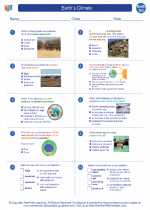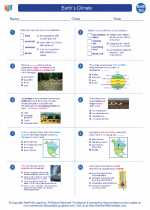Climate Change
Climate change refers to significant and long-term changes in the Earth's climate, including changes in temperature, precipitation, and wind patterns. These changes are primarily driven by human activities, such as the burning of fossil fuels, deforestation, and industrial processes, which release greenhouse gases into the atmosphere. These greenhouse gases, including carbon dioxide, methane, and nitrous oxide, trap heat and cause the Earth's temperature to rise, leading to a wide range of environmental and societal impacts.
Causes of Climate Change
- Burning of fossil fuels
- Deforestation
- Industrial processes
- Agricultural practices
- Land use changes
Effects of Climate Change
- Rising global temperatures
- Changing precipitation patterns
- More frequent and severe weather events (e.g., hurricanes, heatwaves, and droughts)
- Melting ice caps and rising sea levels
- Loss of biodiversity
- Impact on agriculture and food security
- Health impacts (e.g., heat-related illnesses, spread of infectious diseases)
- Economic and social disruptions
Study Guide
To understand climate change, it's important to study the following key concepts:
- Greenhouse Effect: Explain how greenhouse gases trap heat in the Earth's atmosphere, leading to the warming of the planet.
- Human Activities: Discuss the primary human activities that contribute to the increase in greenhouse gas emissions, such as burning fossil fuels and deforestation.
- Climate Models: Explore the use of climate models to predict future climate scenarios and assess the potential impacts of climate change.
- Impact on Ecosystems: Analyze the effects of climate change on natural ecosystems, including changes in species distribution, habitat loss, and extinction risks.
- Adaptation and Mitigation: Discuss strategies for adapting to and mitigating the effects of climate change, including sustainable energy sources, reforestation, and policy interventions.
Additionally, students can explore case studies and real-world examples of climate change impacts in different regions of the world, as well as the role of international agreements and organizations in addressing this global issue.
Understanding climate change is crucial for students to become informed global citizens and to contribute to efforts aimed at reducing greenhouse gas emissions and building resilience to the impacts of a changing climate.
[Climate Change] Related Worksheets and Study Guides:
.◂Earth Science Worksheets and Study Guides High School. Earth`s Climate

 Worksheet/Answer key
Worksheet/Answer key
 Worksheet/Answer key
Worksheet/Answer key
 Vocabulary/Answer key
Vocabulary/Answer key
 Vocabulary/Answer key
Vocabulary/Answer key
 Vocabulary/Answer key
Vocabulary/Answer key
